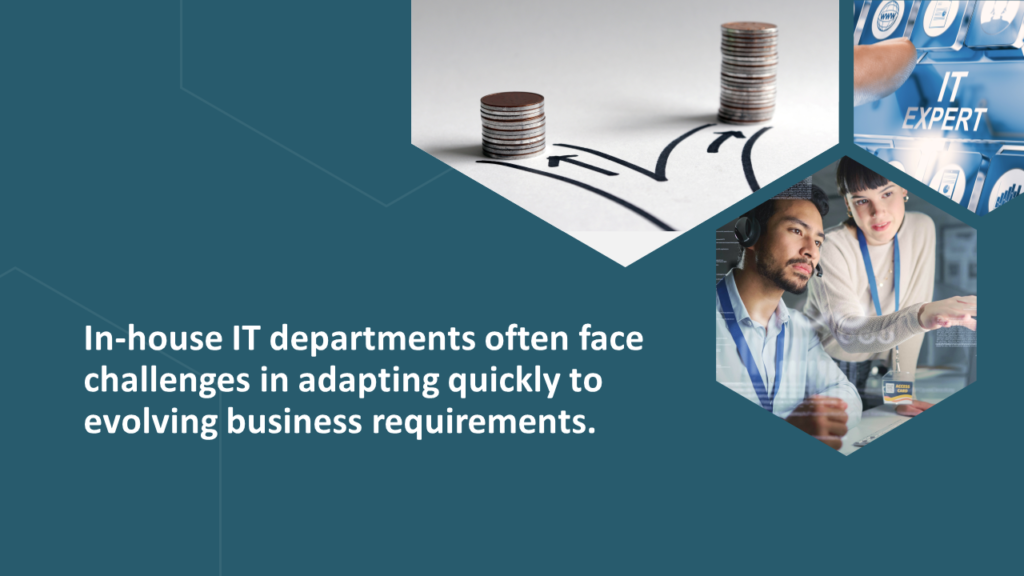Comparing Costs: In-House IT vs. External IT Consultants
The efficient management of information technology (IT) plays a critical role in an organization’s success. For businesses, the decision of how to handle their IT needs is crucial. It often boils down to choosing between an in-house IT department or leveraging the expertise of external IT consultants. Both options have their own set of advantages and challenges. But the financial aspect is a significant factor that drives this decision.
Let’s delve into the significance of comparing costs between in-house IT and external IT consultants. By thoroughly analyzing the financial implications of these two approaches, businesses can make well-informed decisions that align with their unique needs and circumstances.
In-House IT: Costs and Considerations
Normally, businesses find it convenient to go for an in-house IT team that will take charge and keep an eye on operations. However, that does have some limitations, concerns and considerations. It’s essential to look into the key factors like costing and management.
Personnel Costs
Salaries, Benefits, and Overhead for In-House IT Staff
One of the most substantial expenses associated with maintaining an in-house IT department is the payroll. IT professionals command competitive salaries due to the specialized nature of their work. Additionally, businesses must factor in the cost of providing benefits like health insurance, retirement plans, and other perks to retain skilled IT staff. These costs can quickly add up, making personnel costs a significant portion of the IT budget.
Costs Associated with Hiring, Training, and Retaining Employees
In-house IT departments require constant investment in training and development to keep up with ever-evolving technology. Furthermore, recruitment and onboarding of IT personnel involves additional expenses. High turnover rates can also result in costs related to recruitment and training, further impacting the budget.
Overhead and Administrative Costs
Office Space, Utilities, and Associated Expenses
In-house IT departments require physical office space, which comes with its own costs. Businesses need to account for rent or real estate expenses, utilities, and other office-related overheads. This adds a fixed cost to the budget, which might not be flexible in times of economic uncertainty.
Administrative and Management Costs
Administrative tasks, such as payroll, HR functions, and IT management, require dedicated personnel. This entails additional salaries and administrative costs that should be considered when calculating the total cost of in-house IT.
Flexibility and Scalability
Limitations in Adapting to Changing Business Needs
In-house IT departments often face challenges in adapting quickly to evolving business requirements. Hiring, training, and scaling up or down in response to market dynamics can be time-consuming and expensive. This lack of flexibility can hinder the organization’s ability to remain agile and competitive.
Impacts on Scalability and Agility
In a rapidly changing business environment, scalability and agility are crucial. In-house IT may struggle to match the agility offered by external IT consultants who can swiftly scale up or down to meet varying business needs without the constraints of a permanent staff.
External IT Consultants: Costs and Considerations
The decision to engage external IT consultants comes with a myriad of considerations, ranging from costs to the specific expertise required. You need to delve into the intricacies of outsourcing IT services, examine the financial implications and assess the potential benefits in order to make informed decisions. Here are some things to consider:
Consulting Fees
Understanding the Pricing Models Used by External IT Consultants
External IT consultants often employ various pricing models, including hourly rates, fixed project fees, or retainer agreements. Understanding these pricing structures is essential for budgeting and cost analysis. And having this type of flexibility makes it easier for businesses to manage costs associated with IT initiatives.
Specialized Expertise
Benefits of Accessing Specialized Knowledge and Skills
External IT consultants often bring specialized expertise to the table. They can offer valuable insights and solutions that in-house teams may lack. This strategic expertise not only adds immense value to your projects but also translates into significant cost savings. By engaging external consultants for short durations, businesses gain immediate access to the precise expertise required, optimizing resource allocation and ensuring a cost-effective approach to securing the specialized knowledge essential for success.
Calculating the Value of Expert Guidance
While external IT consultants come at a price, it’s essential to calculate the value of their expert guidance. Businesses should examine the potential cost savings, increased productivity, and competitive advantage resulting from the consultant’s expertise. Engaging a team of consultants, each bringing distinct expertise, for the duration of your project can yield substantial benefits at a cost lower than employing a full-time staff member. This shift in perspective underscores the value proposition, highlighting how strategic investments in external expertise can yield a more comprehensive and cost-effective solution for your business needs.
Project-Based Costs
Assessing the Cost-Effectiveness of Project-Based Consulting
Project-based consulting can be a cost-effective solution for specific tasks, such as software development or system integration. Instead of maintaining a permanent IT staff, businesses can hire external consultants for particular projects, reducing long-term overhead.
Flexibility and Scalability
Advantages of Scalability and Adaptability with External Consultants
External IT consultants offer businesses the advantage of scalability and adaptability. Companies can easily adjust their IT support as needed, whether it’s scaling up for new projects or downsizing during slower periods. This flexibility ensures that costs remain aligned with the organization’s current requirements.
Meeting Varying Business Needs with Ease
External consultants can quickly adapt to varying business needs, making them an attractive option for organizations that face fluctuations in their IT demands. This adaptability enables businesses to respond more efficiently to market changes and growth opportunities.
Decision-Making Factors
When comparing the costs of in-house IT and external IT consultants, several key factors come into play. Businesses should consider their unique goals, project requirements, and financial resources:
1. Business Goals: Assess the organization’s long-term objectives and how IT support aligns with those goals. Consider whether in-house IT or external consultants better facilitate the achievement of these goals.
2. Project Requirements: Examine the nature of the projects and tasks at hand. Highly specialized and short-term projects may benefit from external consultants, while ongoing, complex IT operations might favor an in-house team.
3. Budget Constraints: Evaluate the organization’s financial resources and constraints. Calculate the total cost of ownership for in-house IT and compare it with the estimated costs of external consultants.
4. Scalability Needs: Consider how quickly the organization needs to scale its IT support in response to market changes or growth opportunities. Assess the ability of in-house IT and external consultants to meet these needs.
Bottom Line
The decision to choose between in-house IT and external IT consultants ultimately hinges on a thorough analysis of the financial aspects, as well as the organization’s specific goals and requirements. It’s crucial for businesses to make informed decisions that align with their unique circumstances and financial capabilities.
And it’s important to remember that even if you do have an in-house IT team, it’s easy to augment with external consultants when you need them. This strategic collaboration allows your organization to access specialized skills and knowledge precisely when required, ensuring a dynamic response to evolving challenges or project-specific demands. By seamlessly integrating external consultants with your in-house team, you not only enhance your capabilities but also cultivate a flexible and adaptive IT infrastructure. This hybrid approach empowers your business to navigate the complexities of the ever-changing technological landscape with agility and efficiency, leveraging external expertise as a strategic supplement to your internal resources.
i3solutions has extensive experience with augmenting IT teams. Whether you need us for targeted project assistance, specialized expertise, or to bolster your in-house capabilities, our dedicated team of experts is poised to seamlessly integrate with your existing IT infrastructure. We pride ourselves on delivering tailored solutions that precisely align with your unique requirements, ensuring a harmonious collaboration that enhances your team’s efficiency and overall performance. With i3solutions as your strategic partner, you can confidently navigate the intricate challenges of the digital landscape, knowing that our proven experience s will empower your organization to thrive in a rapidly evolving technological environment. Contact us today for help with your IT initiatives.
Leave a Comment




